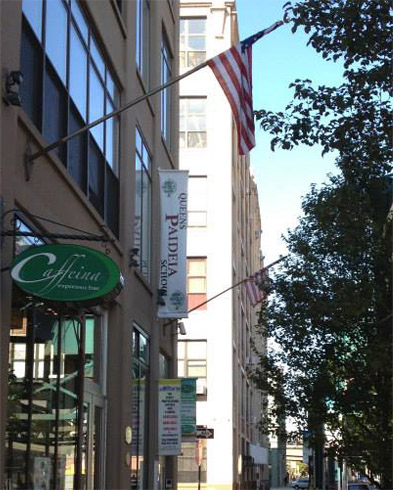
For twelve years starting in 2009, the foundation operated a school that modeled a new way to implement personalized instruction. Named Queens Paideia School (QPS), it was the methodological successor entity of the Paideia School that Mechner had previously operated in Armonk, NY.
Queens Paideia’s main mission was to demonstrate that the Paideia Individualized Education (PIE) approach is a superior way to organize and operate K-12 grade schools. By maintaining a 6:1 student-teacher ratio, a small team of Learning Managers (a term for teacher), responds to each of approximately 40 students’ unique learning needs and potential. This approach averts failure patterns because students work at their actual own levels of achievement in each subject and at their personal best pace. Many children who might elsewhere be categorized as “special needs” are integrated and mainstreamed while exceptionally gifted and talented student can move ahead unhindered.
Every student learns the basic skills by responding actively (not just listening to a teacher) and receiving real-time personalized feedback. The 6:1 ratio permits the team to address all aspects of every child’s educational development, not only the academic aspects (reading, writing, math, science, foreign language, and social studies) but also such skills as collaboration, inquiry, communication, working well with others, and self-management. Special emphasis is placed on the development of thinking skills, social-emotional maturation, and the arts. Even the youngest students make daily journal entries regarding their learning activities and progress. This results in students gradually taking ownership of their education and laying the foundation for becoming lifelong learners.
The overhanging question has always been whether the Paideia methodology can be scaled up and will deliver the same results in the hands of others. Our analyses suggest that when a number of 40-student PIE schools are aggregated to form a larger school in which small schools operate as self-contained units, the benefits of the model are preserved at an acceptable per-pupil cost. But the question can be answered validly only by actual experiment.
Accordingly, the foundation has recently entered into a collaboration with a group willing to implement the QPS approach and philosophy (with participation of the former QPS staff and management and most of QPS’s former student body). The group, located in the same LIC neighborhood, operates pre-schools that will serve as a feeder for future first grade students. From the Mechner Foundation’s standpoint, this collaboration will help answer the perennial question as to whether QPS’s methodology can be scaled up and implemented by others.

